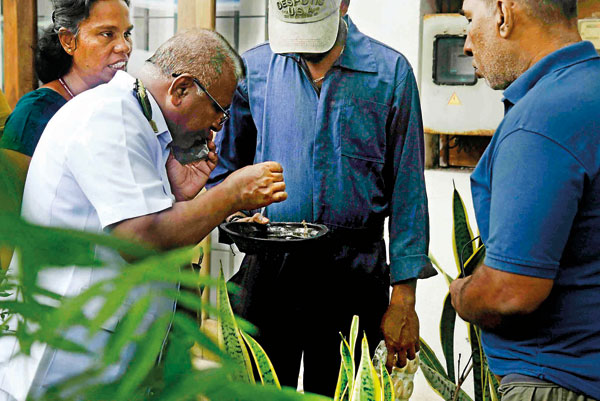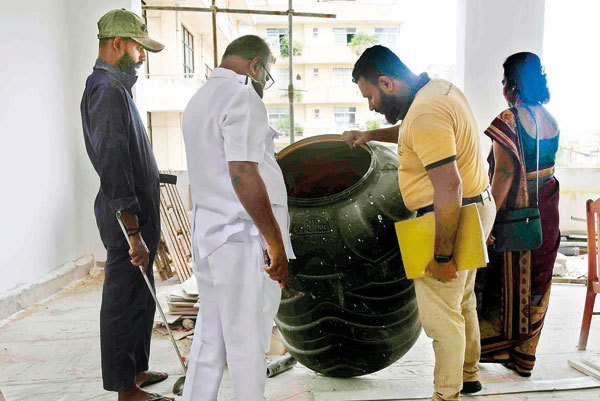News
NDCU launches preemptive strike to prevent post-flood dengue upsurge
View(s):By Hafsa Sabry
As the monsoon rains show signs of slowing down after causing flood havoc in several districts in the past two weeks, fears of a surge in dengue cases have pushed the authorities to launch a countrywide combat programme.
“With the monsoon rains subsiding, a heightened dengue threat looms over the country,” said Dr. Sudath Samaraweera, Acting Director General of the National Dengue Control Unit (NDCU).
According to the NDCU, more than 25,000 dengue cases have been recorded throughout the country since the beginning of this year.

NDCU has ramped up efforts to eliminate breeding sites and educate the people on preventive measures. Pix by Akila Jayawardena
The highest number of 10,000 cases was recorded in January, during which the country experienced above-average rainfall. But the recorded cases decreased to 6,000 in February and between 2,500 and 2,400 in subsequent months. However, with the onset of the southwest monsoon mid-last month, the risk of a surge in dengue cases has intensified.
Together with the armed forces, the NDCU has ramped up efforts to eliminate breeding sites and educate the people on preventive measures.
“Water collectors get washed away during heavy rains, but once the rains cease, these sites become prime breeding grounds for dengue-carrying mosquitoes,” Dr. Samaraweera said, adding that small containers like yoghurt cups, tins, and polythene sheets could accumulate water, providing an ideal environment for mosquito larvae to thrive.
Pointing out that the NDCU’s initiative focused on identifying and eliminating potential breeding sites, he called on public cooperation in this fight against dengue. The NDCU urges citizens to inspect their surroundings and remove any standing water.
During inspections, officials educate residents about potential breeding sites and encourage them to clean these areas. Repeat offenders who fail to comply after several warnings will face legal action and fines of Rs. 1,500–2,000.
Urban areas are particularly vulnerable, but dengue can spread wherever waste is improperly disposed of. The NDCU expects a surge in cases 2-3 weeks after heavy rains, as it takes that long for mosquito eggs to hatch and larvae to mature into adults. Hence, vigilance and proactive measures are crucial, Dr. Samaraweera said.

Dengue mosquitoes prefer clean water for breeding. They can lay hundreds to thousands of eggs in small collections of clean water, such as those found in buckets, bottles, pet feeders, and even tree holes. Unlike other mosquitoes, they avoid dirty water and require clean environments to reproduce.
“One of the unfortunate things about these dengue mosquitoes is that they are very clever. If you clean one place, they will immediately find another. It’s like we have to compete with them to eliminate the potential breeding sites.”
He said that the NDCU last week declared a mosquito eradication week, during which officials, NGOs, and government officers conducted house-to-house inspections in vulnerable areas. While residential areas had only a 5% rate of breeding sites, public places such as religious places, new construction sites, and schools reported a significantly higher rate of 18%, particularly in schools. This alarming discovery has prompted a focused campaign to educate schoolchildren and staff about mosquito eradication.
“It is highly concerning that schools have reported a higher percentage of dengue breeding sites and existing dengue hotspots,” he said.
In addition to raising public awareness and physically eliminating breeding sites, the NDCU has teamed up with Australian experts to control the mosquito population through research-based, innovative methods.
One such method is the Sterile Insect Technique (SIT), which involves releasing sterile male mosquitoes into the environment. When these sterile males mate with wild females, no offspring are produced, gradually reducing the mosquito population and the transmission of dengue.
Another approach is the Wolbachia Method, where mosquito populations are infected with Wolbachia, a naturally occurring bacterium that reduces the mosquitoes’ ability to transmit viruses. Infected mosquitoes are then released into the wild, where they breed with the local population, spreading the bacterium and
consequently reducing disease transmission.
“The pilot project for the STI method was conducted with the help of the Kelaniya University’s medical faculty. However, for other steps, we are waiting for collaborators, as the programme is being managed by the Health Ministry.”
“Although a clear timeline is not confirmed, once everything is settled, the authorities will be able to implement this method to control the disease,” he said.
Stressing that controlling dengue is a collective effort, the NDCU Acting DG said the Health Ministry, Education Ministry, media, and the public must work together to minimise the impact of this disease.
Pointing out that placing media advertisements was a costly exercise, he sought the media’s help to combat the dengue threat. “The ministry cannot afford such a high media budget. We have conducted similar campaigns earlier but found them very expensive,” he said.
By eliminating breeding sites, educating communities, and utilising advanced control methods, the NDCU said it aimed to reduce dengue cases and protect public health. The public’s vigilance and cooperation could make a significant difference in this critical fight against dengue, Dr. Samaraweera said.
The best way to say that you found the home of your dreams is by finding it on Hitad.lk. We have listings for apartments for sale or rent in Sri Lanka, no matter what locale you're looking for! Whether you live in Colombo, Galle, Kandy, Matara, Jaffna and more - we've got them all!

